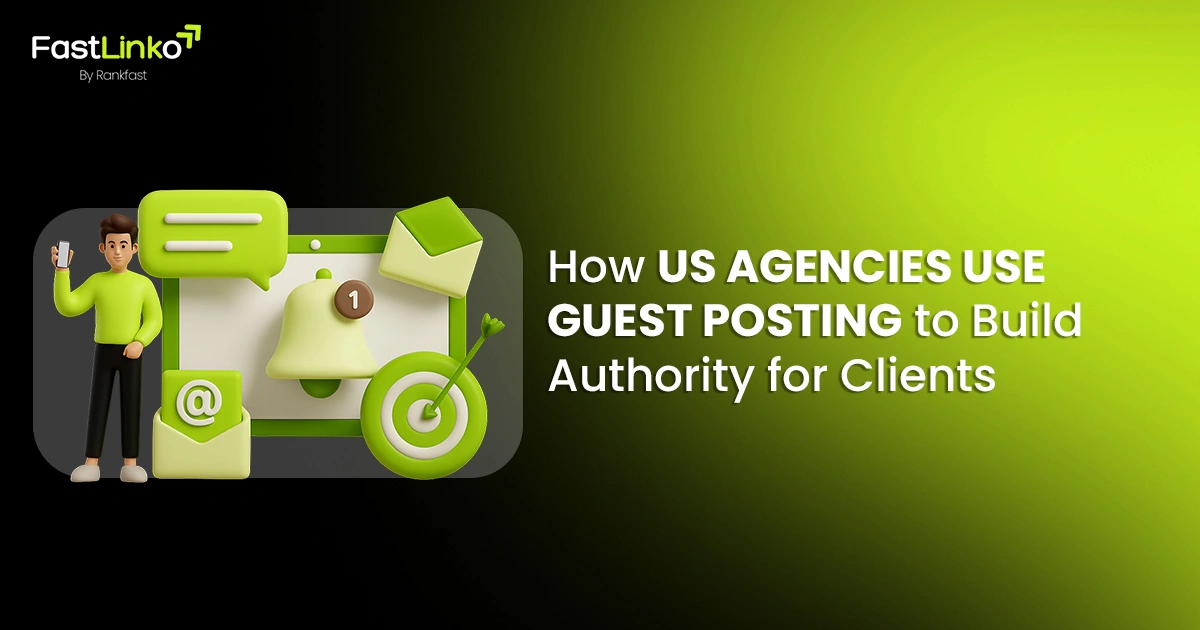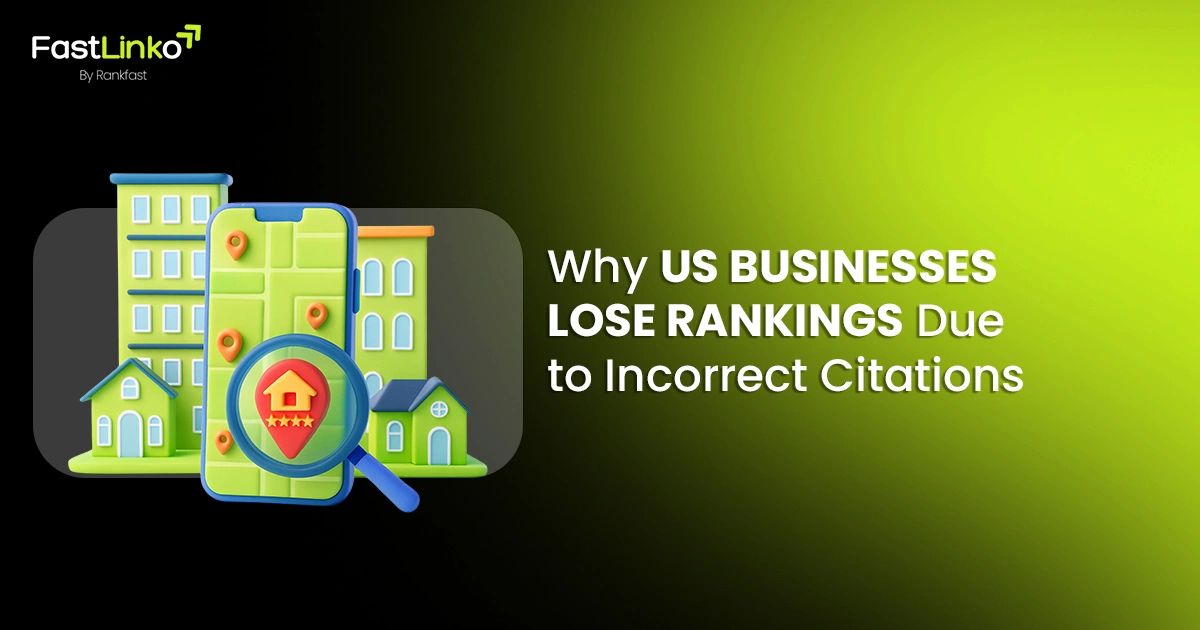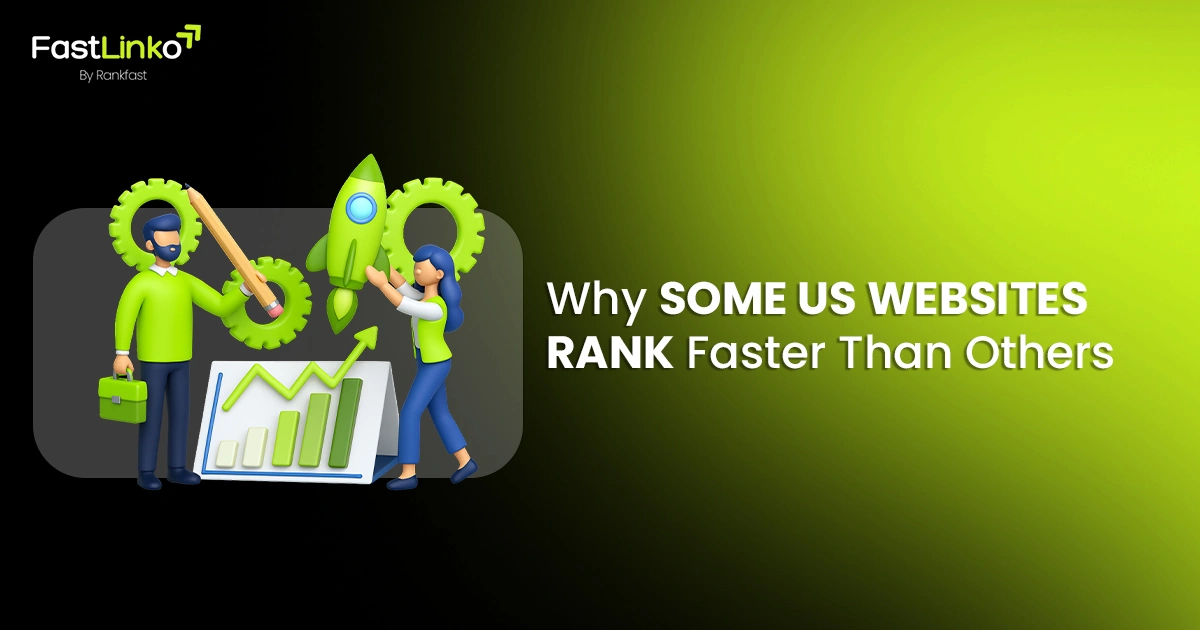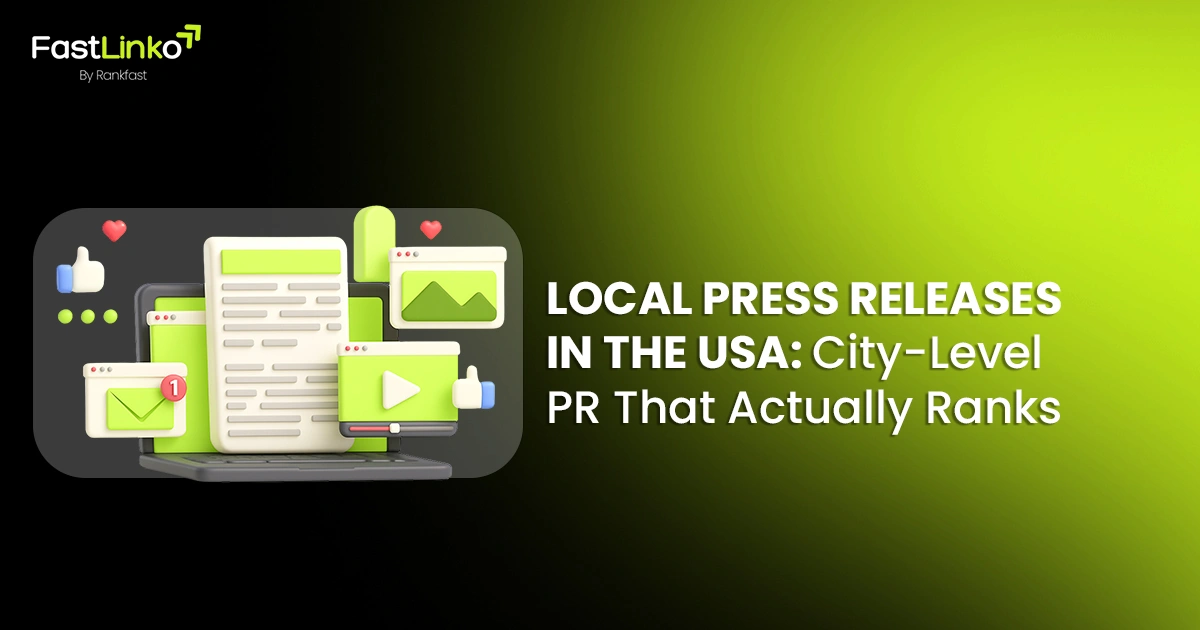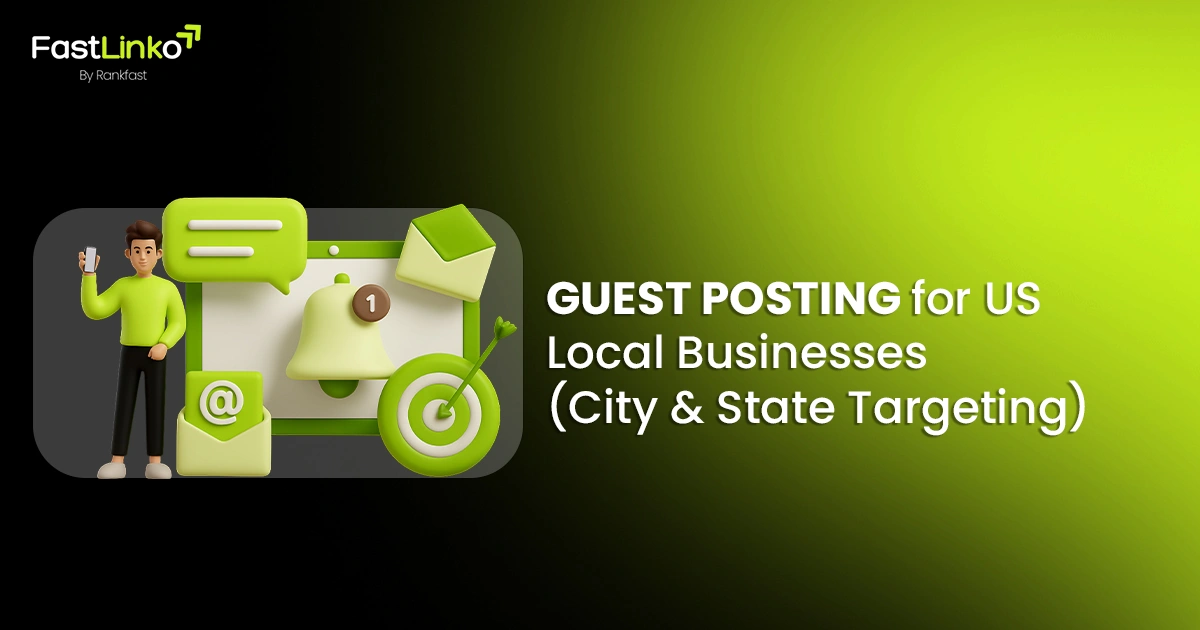
Why Local Citations Are Crucial For Your Local SEO in 2025
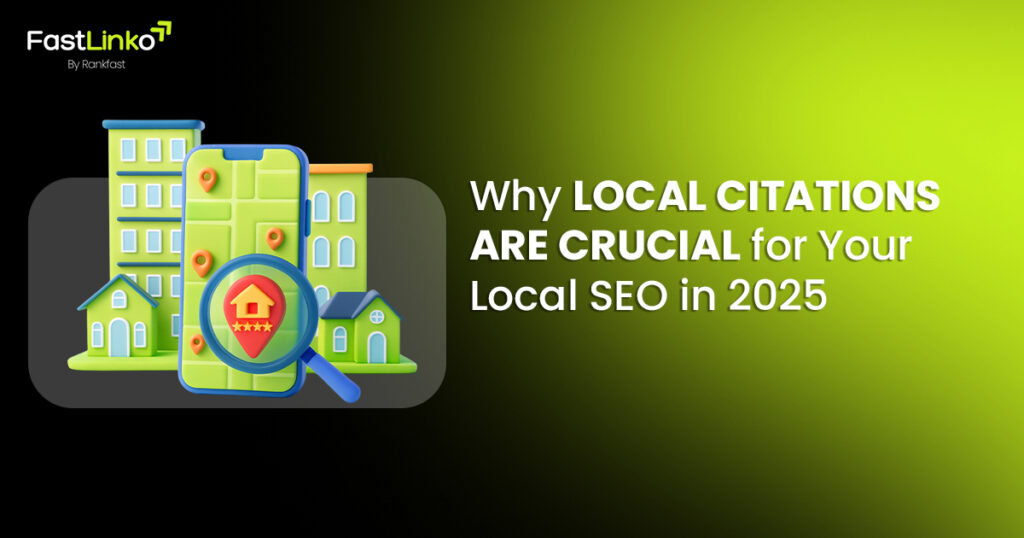
About Author
Recent post
Why US Businesses Lose Rankings Due to Incorrect Citations
Why Some US Websites Rank Faster Than Others
Local Press Releases in the USA: City-Level PR That Actually Ranks
Guest Posting for US Local Businesses (City & State Targeting)
Categories
Today, local searches are the go-to platform for consumers and buyers across the B2B sector. Studies say, businesses with 30+ citations experienced an unprecedented 136% increase in consumer action.
With evolving SEO metrics, brand perception is also being redefined. Its weight is shifting from website development and advertisements to the quality and credibility of online listings.
Local citation building steps in right here. At surface level, they’re just mentions of a business’s name, address, and contact details on different online directories. But the impact they create has a much stronger impact.
For businesses, local citation services optimise backlink placement and boost local SEO rankings. For buyers, those same details work as proof of credibility. Having clear, consistent information inspires trust. However, having blanks, misalignment or variation in your data across directories damages user intent.
Let’s take a closer look at why citations matter so much in the age of AI and local-first search. From rankings to reviews, this blog will explore how they influence search visibility and buyer trust to gain a competitive edge.
The Role Of Citations Today

For a long time, local SEO citation building services were blindly equated to backlink building. That lens however, is outdated.
In 2025, citations work as identity stamps for your business, across the web. They act like digital ID proofs. Consistent and reinforced signals across many directories verify your online existence and credibility. These signals reinforce trust not only to search engines but to business and buyers as well.
In fact, local citation sites now anchor AI-research and results, map-pack rankings, and voice search responses. If your citations conflict, you don’t just lose ranking on SERPs. Your business faces the risk of being removed out of search engine results entirely.
Their increasing influence is a product of:
- AI And Assistants: Tools like ChatGPT, Google Bard, or Alexa pull citations only from verified and consistent sources. Conflicting contact details or addresses convey your business is unreliable to these systems. As a result, you vanish from the search results and recommendation cycle.
- Maps And Hyperlocal: Inconsistent citations confuse Google and its Map-pack inclusion. A single mismatch in address can mean customers drive to the wrong location and out of frustration, simply never try again. Consistency in data is what keeps you discoverable in micro-markets. In niche circles, user intent is usually the highest.
- Vernacular Search: Indian search queries are surging in Hindi, Tamil, Marathi, and regional voices. For these, citations act as grounding data. If your online profile isn’t consistent, your business never reaches those viewers, losing a major chunk of audience.
For small businesses, citations establish credibility without a heavy ad spend. For organisations, they are the only way to maintain a cohesive identity across multiple areas.
Now let’s glance at the types of local citations.
Types Of Local Citations In 2025

Local visibility in today’s digital era doesn’t begin with a website or an ad.
It starts with a business citation. Recent studies suggest that over 68% of Searchers Trust Google Pack-3 Results. Google also reports that 60% of mobile users reach out to businesses directly using the search results. With such strong results, the importance of citations can not be denied
Needless to say, local citations directly influence 2 key decisions for SERPs.
- Whether a business shows up in discovery, and
- If it can be trusted, once discovered.
Nowadays, there are many new citation formats.
- Core Listings: Maps & Directories
Popular listing firms behave like the gatekeepers of local search.
A Backlinko research found that 5 most trusted platforms used by viewers to find information about local businesses are –
- Google (66%)
- Google Maps (45%)
- Business website (36%)
- Facebook and Yelp (32%)
Their website determines if a business can qualify for the map pack. As one of the largest drivers of inbound leads, it brings in massive online and local traction.
Inconsistent details across the internet don’t just confuse users, they block ranking signals at the source. For multi-location firms, centralised citation management is like maintaining digital hygiene.
- Industry-Specific Directories
Aimless marketing has no use when high intent users rely on targeted listings. A law firm listed on a bar association portal or a manufacturer cited in a trade directory signals relevance far beyond a simple Google listing.
These citations hold disproportionate importance because viewers trust industry-specific directories like Fastlinko as filters of credibility.
- Hyperlocal Mentions
City portals, chambers of commerce, and regional digital media build a reputational stronghold that broad directories cannot.
In 2025, they also feed a second loop: validation for AI assistants like Gemini, Copilot, and ChatGPT. These systems cross-check hyperlocal signals to authenticate their legitimacy. Businesses in these ecosystems are not only created by founders but also by the algorithms shaping future search.
- Social & Vernacular Citations
The rise of voice and vernacular queries, especially in markets like India makes regional citations unavoidable.
A business cited in regional directories or mentioned in active local Facebook groups is at a better ground position. They are placed directly within the reach of consumers. These listings aren’t fringe mentions. They are adaptive signals for how user intent is shifting to local accessibility.
- Functional Platforms
Food delivery apps, cab services, healthcare portals, and travel engines merge the fine line between citation and commerce. For many small businesses, being cited on popular platforms matters more than being listed on a traditional SEO directory. These platforms meet customers mid-action, at the point where discovery directly converts into revenue.
Citations today aren’t peripheral SEO tasks. They are a business’s local passport. Local citations are proof points that shape visibility, trust, and recommendation across both human and algorithmic clientele.
The more precise and relevant your local citations are, the more they compound into lasting market advantage.
Why Local Citations Are Crucial For Your Local SEO In 2025

In 2025, local search determines the target audience’s first impression.
Way before a buyer clicks on your website, they’re already judging your services through your presence on maps, directories, and trusted online platforms. This visibility depends on citations, the simple mentions of your business name, address, and contact details.
Here’s why local citations are crucial for your local SEO in 2025:
- Search engines treat citations as proof.
For Google, Bing, and Apple Maps, citations are consistency checks. When your business details appear the same across multiple platforms, it shows reliability. Even a small mismatch in address or phone number can confuse algorithms and lower your ranking in the local pack. - Buyers read citations as credibility signals.
A prospective client scanning suppliers or service providers will trust those with clean, consistent listings across multiple sites. If one directory lists an outdated phone number while another shows a different address, the trust erodes before contact is even initiated. - The scope of local SEO has expanded.
Earlier, businesses could get rankings with a Google Business Profile and a few major directories. In 2025, viewers are better informed and also look at trade associations, niche B2B listings, and regional portals. These sources carry stronger value than generic directories. They have a higher weightage on SERPs as industry leaders. - AI assistants cross-check citations.
With tools like Gemini, Copilot, and ChatGPT handling more consumer and B2B queries, your visibility is dependent on whether AI can verify your digital presence or not. Citations act as training data for these models, if your details are missing or inconsistent, you’re less likely to be surfaced in AI-driven recommendations. - Regional and social citations are rising.
In India and other emerging markets, local-language directories and community platforms are gaining traction. Being mentioned on regional Facebook groups, LinkedIn company profiles, or vernacular business listings directly feeds into voice searches, AI results and map packs. (“best café near me” in Hindi, Tamil, or Bengali). - Practical platforms matter.
For many small businesses, citations on food delivery apps, cab services, booking engines, or healthcare portals generate more conversions than backlinks. These listings connect you to customers at the exact moment of intent, right as a user is placing orders. This makes them powerful discovery touchpoints.
How Businesses Can Strengthen Local Citations in 2025

Managing citations is about building a digital proof of identity that both search engines and buyers can verify. Leaders should approach citation building as a strategic branding asset, not a digital marketing checklist. Here are a few tips or brands to strengthen local citation for local SEO in 2025.
- Think Compliance, Not Marketing
Just as financial records need auditing, citations demand accuracy across all touchpoints. Inconsistent NAP (Name, Address, Phone) details don’t just hurt rankings. They signal operational negligence to buyers. Citations should be treated as part of brand governance.
- Prioritise Platforms by Buyer Journey
A listing on generic directories might generate a few clicks, but its impact fades quickly. However, a citation in an industry association portal or procurement database shortens the sales cycle. Citations should be aligned with where clients actually research vendors.
- Localisation – a Competitive Moat
Vernacular and hyperlocal directories are also catching up. In India, 70% of voice searches happen in regional languages. Businesses that localise citations gain access to high-intent buyers their competitors ignore.
- Future-Proof with AI Readiness
AI systems don’t rank content, they recommend it. If your business isn’t being cited or ranked across trusted sources, you risk being invisible in AI-driven discovery.
- Measure Beyond SEO
Along with your website traffic, measure sales inquiries, vendor partnerships, and customer conversions that originate from citations. This positions citations as a revenue lever, not a marketing cost.
Strong citations in 2025 are digital proof points. They assure algorithms of your existence and buyers of your credibility.
The Takeaway
Local citations are the backbone of online traction in 2025. They are mentions of your business name, address, and contact details across trusted platforms. But their value goes far beyond a simple listing.
Why they matter:
- Search engines trust them: Consistent citations reflect that your business is real and reliable. Inaccurate or mismatched details can lower rankings.
- Buyers notice them: Clear, consistent listings build credibility and confidence before a prospect client even visits your website.
- Multi-layer impact: Core maps and directories, industry-specific listings, regional media, and social or vernacular platforms all reinforce visibility and authority among viewers.
- AI-ready signals: Tools like ChatGPT, Gemini, and Copilot rely on verified citations to recommend businesses accurately.
For small businesses, citations boost trust without heavy marketing spend. For larger firms, they maintain a consistent identity across markets. In 2025, citations do more than local SEO, they are a one-stop solution that compound trust, visibility, and local authority over time.
FAQs
What are local citations in SEO?
Local citations are online listings of your business’s name, address, and phone number (NAP) on directories, maps, and industry platforms. They act as digital identity proofs and improve your local SEO rankings by building buyer’s trust.
How do local citations improve local SEO rankings?
Citations act as verification signals for search engines. Having synced NAP details across local citation sites tells Google that your business is reliable. It also increases your chances of appearing in local search results and map packs.
What is the difference between a backlink and a citation?
A backlink is a hyperlink to your website, whereas a citation is a mention of your business with NAP details.
How do AI assistants use citations?
AI assistants go through and cross-check citations in order to verify a business’s legitimacy. If your details are missing or inconsistent, your business won’t appear in the AI-powered search recommendation section.
What happens if my citations are inconsistent?
Differing citations confuse both users and posters. Search engines and AI assistants drop inconsistent businesses from recommendations. Google Maps may misdirect customers, damaging local SEO performance and credibility.
- Your cart is empty Browse Shop
DISCUSS NEW PROJECT OR JUST TO SAY HELLO GET IN TOUCH WITH US
info@Fastlinko.com
+91-9990725969
200 Park Home Avenue
M2R 1A2 North York, ON, Canada
© Fastlinko 2025 . All rights reserved, Rankfast



